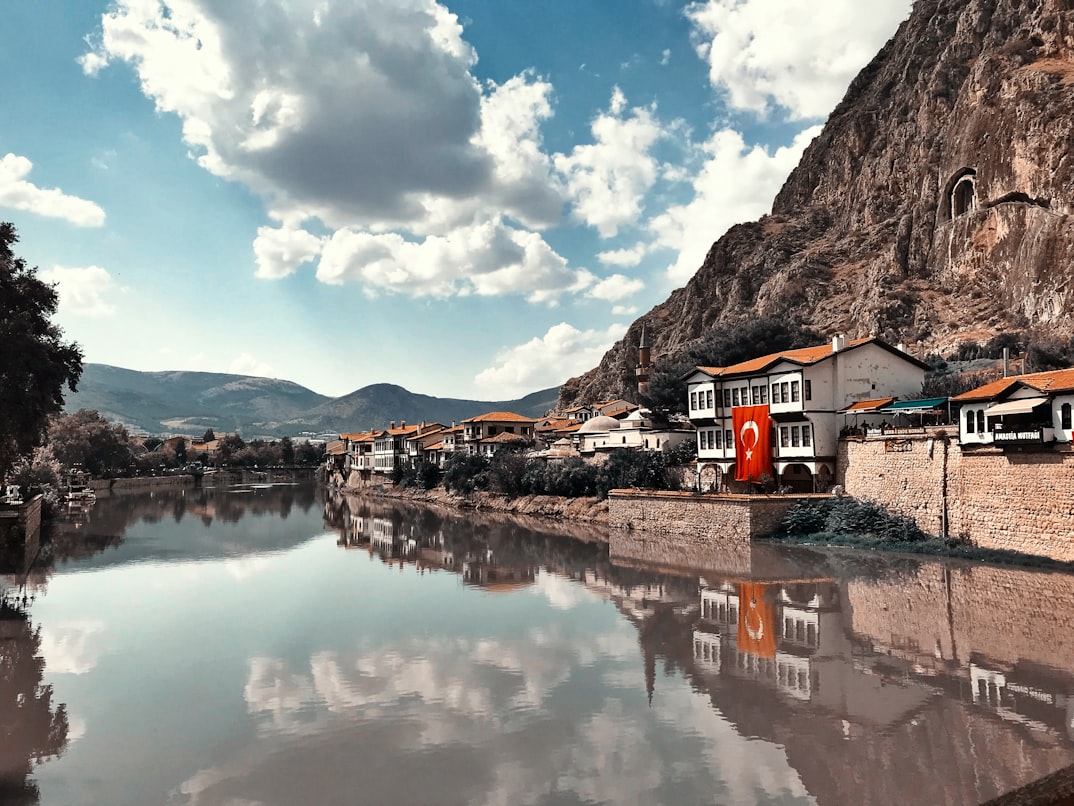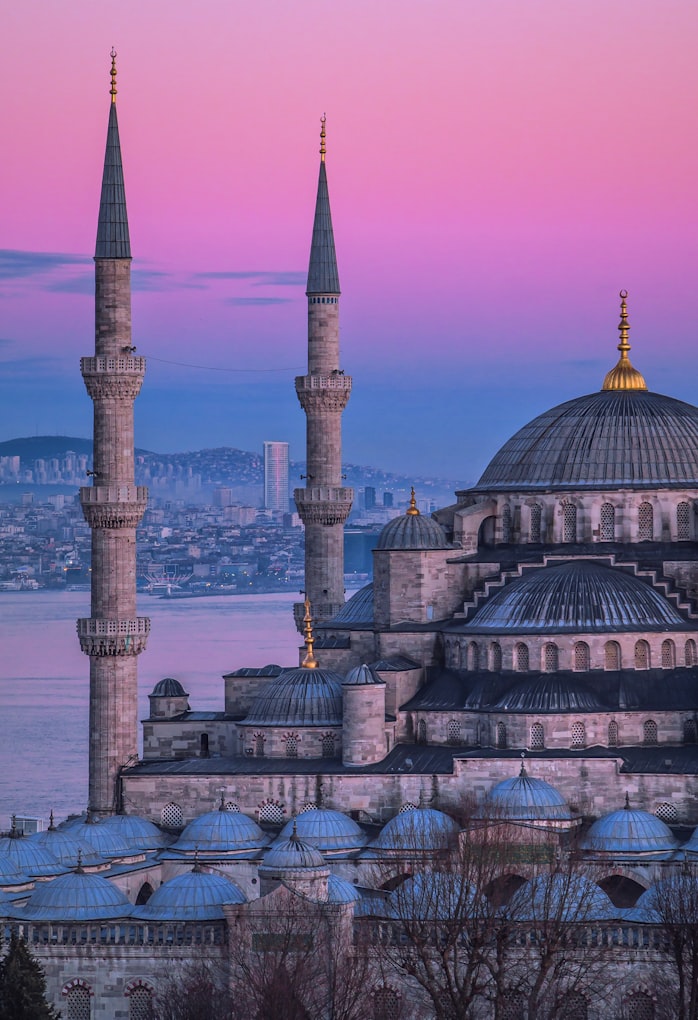Top Attractions
Turkey is a country of timeless marvels. In Istanbul, you’ll walk through history at every turn. Marvel at the grandeur of Hagia Sophia, once a Byzantine church, later an Ottoman mosque, now a striking symbol of Turkey’s layered past. Across from it lies the majestic Blue Mosque, with its six minarets and blue-tiled interior, and nearby, the underground Basilica Cistern enchants with its haunting columns and atmospheric lighting.
Explore the lively Grand Bazaar, one of the world’s oldest covered markets, and the Spice Bazaar, where aromas of saffron and sumac linger. The Topkapi Palace, once home to Ottoman sultans, offers panoramic Bosphorus views and dazzling treasures.
Beyond Istanbul, Cappadocia stuns visitors with its surreal fairy chimneys, cave dwellings, and sunrise hot air balloon rides. The ancient city of Ephesus, one of the best-preserved Roman cities, captivates with its grand library, amphitheater, and marble avenues.
The white terraces of Pamukkale, formed by calcium-rich hot springs, are a natural wonder that also houses the ruins of Hierapolis. In the south, the Turquoise Coast beckons with azure bays and charming towns like Fethiye, Kas, and Bodrum. For history and legend, visit Troy, Mount Ararat, or the remarkable Göbekli Tepe, the world’s oldest known temple.
Local Dishes
Turkish cuisine is rich, diverse, and full of bold flavors and regional specialties. Kebabs come in many forms — from Adana kebab (spicy ground lamb) to shish kebab (skewered meat). A typical meal might begin with meze, small dishes like stuffed grape leaves, roasted eggplant puree (babagannuş), haydari (garlic yogurt), and spicy ezme.
Pide, often called Turkish pizza, is a boat-shaped flatbread topped with cheese, ground meat, or eggs. Lahmacun, another popular street food, is a thin dough base topped with minced meat and herbs, rolled and eaten on the go.
Breakfast in Turkey is an affair: menemen (eggs scrambled with tomatoes, peppers, and spices), olives, cheeses, fresh bread, and endless glasses of çay (Turkish tea) set the tone.
Sweet tooths will love baklava, made with layers of filo pastry, nuts, and honey syrup, or kunefe, a gooey dessert of cheese, shredded wheat, and syrup served warm. End with a strong cup of Turkish coffee, often read for fortunes afterward.
Transportation Tips
Turkey’s transportation network is modern and extensive. Domestic flights are affordable and save time, especially between Istanbul, Cappadocia, Izmir, and Antalya. Budget airlines like Pegasus and AnadoluJet make regional hopping efficient.
Intercity travel is well-served by long-distance buses, which are comfortable, punctual, and include refreshments — companies like Metro Turizm or Pamukkale offer extensive routes. Trains, including the high-speed line between Istanbul and Ankara, are a scenic and restful alternative.
Within cities, public transportation is reliable. Istanbul’s metro, trams, ferries, and buses are all connected by the Istanbulkart, a rechargeable transit card. Taxis are common but ensure the meter is running, or agree on a price.
In smaller towns or coastal areas, dolmuş (shared minibuses) are an affordable and flexible way to get around. If you plan to explore more remote or coastal areas, renting a car is a good option, with generally well-maintained roads and clear signage.
Budget Travel Tips
Turkey offers excellent value for money, especially outside the major tourist zones. In local eateries called lokantas, you can enjoy hearty traditional meals for $5–10 USD, and street foods like simit (sesame bread rings) or dürüm wraps are even cheaper.
Accommodations range widely, but even in tourist hotspots, budget guesthouses and pensions often cost $20–40 USD per night. Public transport, including intercity buses, is highly affordable and efficient.
Many attractions, like mosques and public markets, are free to visit. To save on museums and ancient sites, consider the Museum Pass Turkey, which offers entry to dozens of key locations for a flat fee.
Traveling in the shoulder seasons (April–June and September–October) brings pleasant weather and lower prices, especially along the coast or in Cappadocia.
Safety Info
Turkey is generally safe for travelers, particularly in major tourist regions like Istanbul, the coast, and Cappadocia. Petty crime such as pickpocketing can occur in crowded areas or transport hubs — stay alert and keep your belongings secure.
Demonstrations should be avoided, and you should stay updated on local news. Some areas near the Syrian border are best avoided due to regional instability — always check current travel advisories.
Tap water in cities is technically safe but not recommended for drinking; bottled water is widely available. In rural areas or mountain villages, always have cash on hand and inform someone if you’re hiking or taking long drives, as mobile signal may be limited.
Cultural Etiquette
Turks are incredibly hospitable, and greetings are sincere and warm — a handshake, a nod, or “Merhaba” (hello) is common. If invited to someone’s home, it’s customary to remove your shoes, and bringing a small gift like pastries or flowers is appreciated.
Dress modestly, particularly in rural areas and when visiting mosques — women should carry a scarf to cover their heads, and both men and women should wear clothing that covers shoulders and knees.
When offered tea, accept it — it’s more than a drink; it’s a gesture of connection. Avoid discussing politics, particularly sensitive topics like secularism or foreign affairs, unless you're familiar with your host’s views. Public displays of affection should be moderate, especially in conservative regions.
Travel Style Fit
Turkey is a dream destination for history lovers, foodies, cultural explorers, photographers, and beach vacationers alike. It offers something for every type of traveler — whether you're soaking in ancient ruins, sipping çay in a riverside village, riding balloons over fairy chimneys, or sailing the Mediterranean on a traditional gulet.
It's equally suited for solo adventurers, couples on a romantic escape, families, and even retirees, thanks to its wide spectrum of experiences, affordability, and warm hospitality.

Best Time to Visit
Turkey is a year-round destination, but your experience will vary by region. The spring (April to June) and autumn (September to October) offer mild weather and fewer tourists, ideal for exploring Istanbul, Ephesus, or Cappadocia.
Summer (July to August) brings hot, dry weather, especially inland, but is perfect for coastal relaxation on the Aegean and Mediterranean shores. This is high season for beach towns like Bodrum and Antalya.
Winter (November to March) sees snowfall in Cappadocia and Eastern Turkey, ideal for skiing in Uludağ or witnessing snow-dusted fairy chimneys. Istanbul remains lively year-round, though cooler and quieter in winter months.
Accommodation Recommendations
Budget travelers will find excellent hostels and pensions like Cheers Hostel in Istanbul or Shoestring Cave House in Cappadocia, with beds ranging from $15–30 USD per night, often including breakfast and rooftop views.
Mid-range guests may enjoy hotels such as Hotel Sultan Hill in Istanbul's Old City or Sultan Cave Suites in Göreme, offering charming decor, warm hospitality, and rates from $60–120 USD.
Luxury seekers can indulge at the Four Seasons Istanbul at Sultanahmet, a former prison turned boutique gem, or D Maris Bay on the Turquoise Coast for a secluded, world-class resort experience. Rates for five-star properties begin around $200 USD and up.
Languages Spoken
Turkish is the official language, and while English is spoken in tourist areas, especially among younger people, it’s helpful to know a few Turkish phrases. “Teşekkür ederim” means thank you, and “Evet” and “Hayır” are yes and no.
In southeastern regions, Kurdish is spoken by many locals, while older generations may know some German or French due to past migration patterns. Turkish signs are common in Latin script, and pronunciation is phonetic, making it easier to learn basic words.
Currency
The official currency is the Turkish Lira (TRY). Cash is widely used, especially in small towns, markets, or rural areas, though credit cards are commonly accepted in cities, hotels, and restaurants.
ATMs are plentiful, and exchange offices often offer better rates than banks. Carry some small bills for tips, transportation, and smaller purchases. Note that the lira can fluctuate — apps like XE Currency help you stay up to date on exchange rates.
Common Traveler Mistakes to Avoid
One mistake is skipping Cappadocia or thinking it’s only for balloon rides — its valleys, rock churches, and culture are worth days of exploration. Another is underestimating distances — Turkey is vast, and travel time between regions can be significant.
Many visitors forget to remove shoes when entering mosques, or dress too casually for religious sites — bring a scarf and modest clothes to be respectful. Also, don’t assume prices are fixed in bazaars; bargaining is expected.
Avoid exchanging currency at airports where rates are unfavorable, and always check ferry schedules in advance if island-hopping or traveling the coast.
Essential Apps & Tools
Google Maps and Moovit are useful for navigation and public transport. Use BiTaksi or iTaksi in Istanbul to hail licensed taxis. Trafi is also great for tracking metro and bus routes.
XE Currency is essential for tracking exchange rates, and Google Translate with offline Turkish is helpful for communication. Booking platforms like Obilet or Busbud are ideal for bus tickets.
For restaurant reviews, Zomato and Foursquare are helpful locally. If you're flying within the country, apps from Turkish Airlines, Pegasus, or AnadoluJet will make planning smoother.
Suggested Itinerary Styles
A 10–14 day itinerary allows for a well-rounded trip. Start with 3–4 days in Istanbul, exploring its mosques, markets, and Bosphorus cruises. Next, head to Cappadocia for 2–3 days of cave hotels, hot air balloons, and valley hikes.
Travel south to Pamukkale and Hierapolis, then move west to Ephesus and Selçuk for ancient ruins. End your trip with 3–4 days along the Turquoise Coast — choose Bodrum, Fethiye, or Antalya for sun, sea, and charming towns. Domestic flights can help bridge long distances efficiently.
Fun Facts
Turkey straddles two continents, with Istanbul being the only major city in the world that lies on both Europe and Asia. It is home to Göbekli Tepe, believed to be the world’s oldest religious site, predating Stonehenge by millennia.
The country boasts more Greek and Roman ruins than Greece or Italy, and the Turkish delight, or “lokum,” has been sweetening palates since the Ottoman Empire.
The tulip, often associated with the Netherlands, actually originated in Turkey, and Noah’s Ark is said to have landed on Mount Ararat, Turkey’s tallest peak.
Turkey is also where Santa Claus (St. Nicholas) was born — in the town of Patara, near Antalya.
